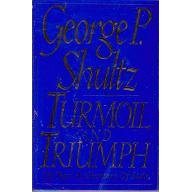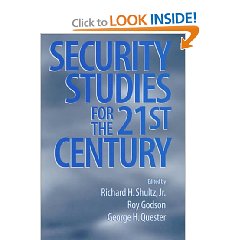Although no longer in print, there are a number of copies floating around, and as long as I was using the book for a new article on strategic intelligence, I thought I would offer up my notes from the flyleaf for the Amazon community. My page numbers are from the 1993 hard cover edition.
Secretary Shultz is a former Marine and says early on in the book that his wife is part of a “package deal.”
Some extremely thoughtful views on competition in the information age, and very strong explicit angry statements against the “cult of secrecy.” Clearly understands the revolution in communications and information technology. p 18
Has some real issues with flaws in raw open source information loaded with unfiltered bias. p. 26
First director of OMB, p. 29, does not evince concerns over the disappearance of the Management function over the years.
Crisis management still not making proper use of open sources of information including commercial imagery, p. 44
CIA under Bill Casey too independent and unreliable. p. 50
Diplomatic “gardening” consists of SecState visiting counterparts on their home turf. p. 128
Vatican intelligence, p. 150
Emphasis throughout on values, integrating cultural policy, cultural strategy, cultural warfare
Firehose of information, nothing offered by intelligence or by information technology managers helped deal with it. p. 272
CIA “wild plan” for Surinam, p. 297
CIA “out of control” in mining Nicaraguan harbors, p. 307
Faulty intelligence to the President, p. 312
Intelligence pattern over time: first alarming and then vague, -. 425
On Strategic Defense Initiative, going to a briefing only to be asked, “Is the Secretary cleared?” Dumbfounded by this. p. 492
“So much for our intelligence” faulty biography on Soviet Premier Tikhonov, p. 493
State/Schultz versus Defense/Weinberger “poison” sapped government cohesion, p. 498
Security reviews, ridiculous impositions, p. 544
CIA botches Yurchenko, p. 595
Intelligence cooking the books, p. 619
Bottom line: Intelligence let this Secretary of State down, and does not appear to have gotten any more competent since then despite a doubling of its budget from $25M to $50M or more (some estimates suggest $70B total).
If you are interested in grand strategy, unified national security (using ALL of the instruments of national power wisely), and the vagaries of a really rotten Presidential inter-agency management process, this book is well worth buying used.





